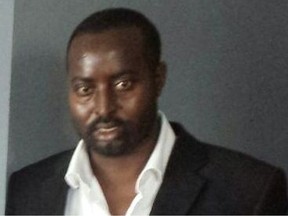The five-person jury is tasked with determining Abdi’s manner and cause of death, as well as giving recommendations to prevent future deaths in similar situations.

Article content
The family of Abdirahman Abdi encouraged a five-person jury to deem the 38-year-old Somali-Canadian man’s death a homicide, after a lengthy public inquest into the man’s death, which followed a violent interaction with Ottawa police.
In fact, several parties, including the two police officers who interacted with Abdi on July 2016, agree the man’s manner of death is homicide, though in the context of an inquest, which does not assign blame, homicide is defined as “injury which was non-accidentally inflicted, by person other than deceased.”
Advertisement 2
Story continues below
Article content
Lawrence Greenspon, the lawyer representing Abdi’s family, urged the jury to find Abdi’s manner of death as a homicide. The five-person jury is tasked with determining Abdi’s manner and cause of death, as well as giving recommendations to prevent future deaths in similar situations.
The six-week-long inquiry heard from neighbours, police officers, Abdi’s psychiatrists, paramedics and more, including two pathologists who had slightly different findings in Abdi’s cause of death.
Dr. Christopher Milroy, who conducted Abdi’s autopsy, concluded Abdi’s death was caused by “post cardiac arrest encephalopathy following blunt trauma in a man with exertion, struggle, acute psychosis, and (underlying) atherosclerotic coronary artery disease.”
That essentially means Abdi had a heart attack following his altercation with police, where he suffered what officers described as “distraction blows” to his face and body, which they say were necessary to subdue the man. The autopsy also determined Abdi struggled and was suffering from psychosis, and also had an underlying heart condition.
Article content
Advertisement 3
Story continues below
Article content
Dr. Michael Pollanen, chief forensic pathologist for Ontario, suggested Abdi’s cause of death also included schizophrenia, along with a similar combination of factors that Milroy concluded.
Anita Szigeti, lawyer for the Empowerment Council, which advocates for people with mental health and addiction issues, says the group “vehemently opposes” Pollanen’s conclusion that schizophrenia contributed to Abdi’s cause of death.
“He died because of force police applied to him, and because they failed to revive him when his heart stopped beating,” she said in her closing remarks. “Having mental health issues may frequently be associated with death and interactions with police, but that doesn’t mean his mental health issues caused his death or were even contributing factors.”
She urged the jury to put themselves in Abdi’s shoes when they form their finding and recommendations.
“What would have helped to de-escalate that situation? What happened? How did things go off the rails? How did they go so wrong?” she said.
David Weir, a former OPS officer, testified that he arrived on scene intent on making an arrest, after receiving multiple calls that Abdi had groped people at a Hintonburg coffee shop.
Advertisement 4
Story continues below
Article content
“From the beginning to the tragic end, that was his focus,” Szigeti said. “That’s a fact, and one that didn’t allow Weir to see another side to this story, one that required empathy and a different approach.”
She encouraged the jury to consider Abdi’s feelings of fear and confusion as he was “in crisis,” and people in crisis may behave unexpectedly.
When the officers were attempting to restrain and arrest Abdi, he was struggling “to survive, not escape,” Szigeti said. “He was fighting for his life. He was breathing what may have been his dying breaths, as his flailing limbs were misinterpreted as acts of violence.”
The jury, she said, has the opportunity to save lives, and improve interactions between police and people in crisis.
Veronica Garcia, the lawyer for Const. Daniel Montsion and Weir, said Pollanen’s cause of death should be used, though, not because Abdi died of schizophrenia, but because mental health played “a significant role in behaviour and how he reacted to police,” and “no doubt played a significant role in his death.”
The jury will now deliberate and consider more than 50 suggested recommendations made by several parties.
Recommended from Editorial
Article content


Comments